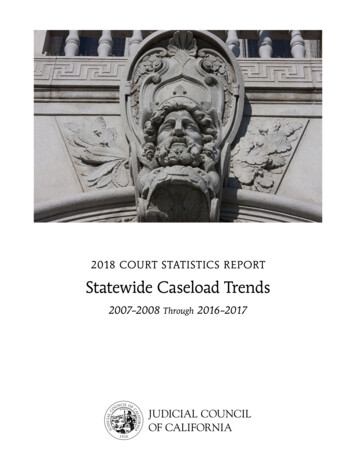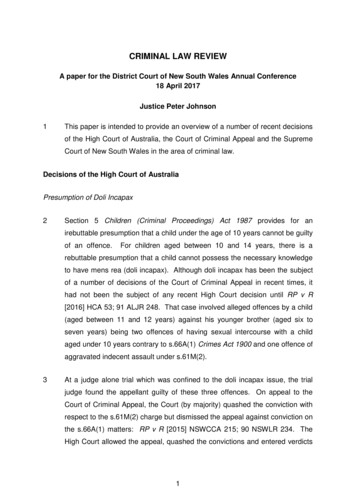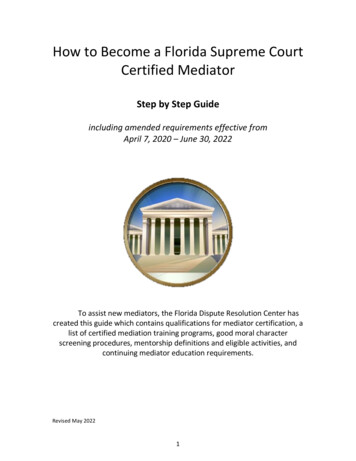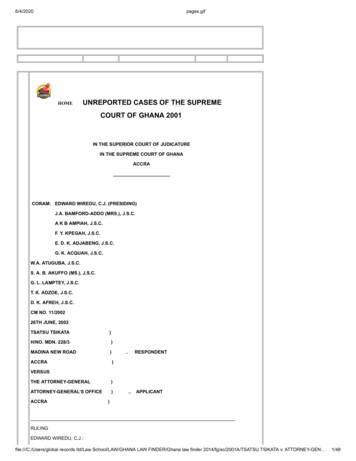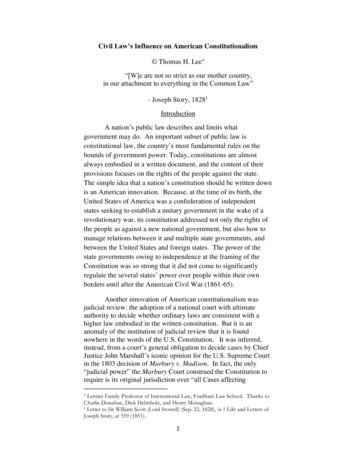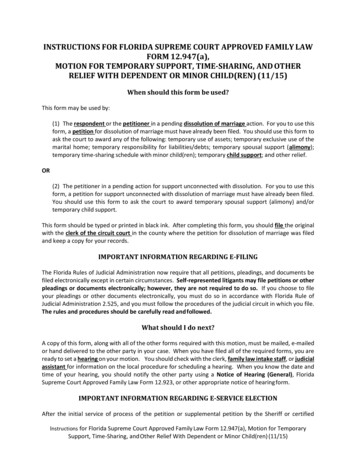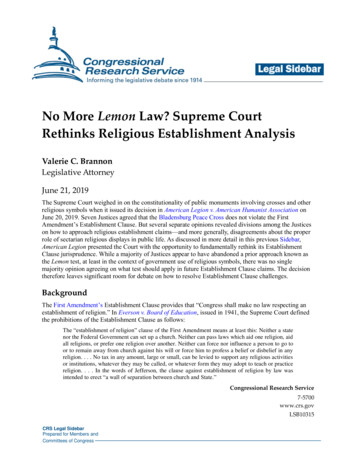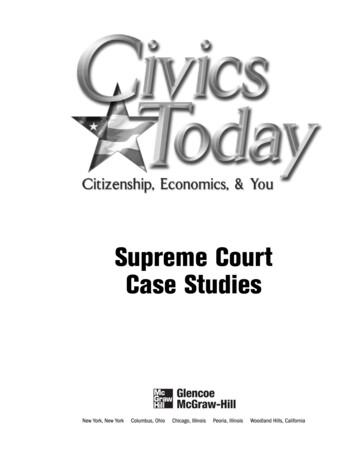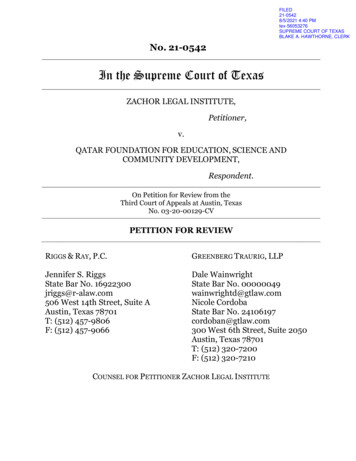
Transcription
FILED21-05428/5/2021 4:40 PMtex-56053276SUPREME COURT OF TEXASBLAKE A. HAWTHORNE, CLERKNo. 21-0542In the Supreme Court of TexasZACHOR LEGAL INSTITUTE,Petitioner,v.QATAR FOUNDATION FOR EDUCATION, SCIENCE ANDCOMMUNITY DEVELOPMENT,Respondent.On Petition for Review from theThird Court of Appeals at Austin, TexasNo. 03-20-00129-CVPETITION FOR REVIEWRIGGS & RAY, P.C.GREENBERG TRAURIG, LLPJennifer S. RiggsState Bar No. 16922300jriggs@r-alaw.com506 West 14th Street, Suite AAustin, Texas 78701T: (512) 457-9806F: (512) 457-9066Dale WainwrightState Bar No. 00000049wainwrightd@gtlaw.comNicole CordobaState Bar No. 24106197cordoban@gtlaw.com300 West 6th Street, Suite 2050Austin, Texas 78701T: (512) 320-7200F: (512) 320-7210COUNSEL FOR PETITIONER ZACHOR LEGAL INSTITUTE
IDENTITIES OF PARTIES AND COUNSELPetitionerZachor Legal InstituteCounsel for PetitionerDale WainwrightState Bar No. 00000049wainwrightd@gtlaw.comNicole CordobaState Bar No. 24106197cordoban@gtlaw.comGREENBERG TRAURIG, LLP300 West 6th Street, Suite 2050Austin, Texas 78701T: (512) 320-7200F: (512) 320-7210Jennifer S. RiggsState Bar No. 16922300jriggs@r-alaw.comRIGGS & RAY, P.C.506 West 14th Street, Suite AAustin, Texas 78701T: (512) 457-9806F: (512) 457-9066RespondentQatar ityCounsel for RespondentD. Patrick LongSQUIRE PATTON BOGGS (US) LLP2000 McKinney Ave.Suite 1700Dallas, Texas 75201T: (214) 758-1500F: (214) 758-1550Amanda D. PriceSQUIRE PATTON BOGGS (US) LLP600 Travis StreetHouston, Texas 77002T: (713) 546-5850F: (713) 546-5830-ii-Wallace B. JeffersonAnna M. BakerALEXANDER DUBOSE & JEFFERSONLLP515 Congress Avenue, Suite 2350Austin, Texas 78701T: (512) 482-9300F: (512) 482-9303
Other PartyTexas Attorney General Ken PaxtonCounsel for Other PartyKen Paxton, Attorney General ofTexasKimberly FuchsOFFICE OF THE ATTORNEY GENERALOF TEXASP.O. Box 12548Austin, Texas 78711T: (512) 475-4195F: (512) 320-01678-iii-
TABLE OF CONTENTSPageIDENTITIES OF PARTIES AND COUNSEL . iiTABLE OF CONTENTS . ivINDEX OF AUTHORITIES . viSTATEMENT REGARDING RECORD REFERENCES . ixTERMS AND PARTY REFERENCES. xSTATEMENT OF THE CASE . xiSTATEMENT OF JURISDICTION . xiiiISSUES PRESENTED. xvINTRODUCTION . 1STATEMENT OF FACTS . 3I.TAMU, a public university, receives funding from QatarFoundation. . 3II.Zachor requested information about funding received by or onbehalf of TAMU from Qatar. . 4III.Qatar Foundation sued the Attorney General to preventdisclosure of the requested information. 5SUMMARY OF THE ARGUMENT . 6ARGUMENT .7I.Standard Of Review. .7II.Unless Clearly And Unambiguously Waived By Statute,Sovereign Immunity Bars Lawsuits Against GovernmentalEntities. . 8III.Before The Lower Court Opinion In This Case, No Texas CourtHad Ever Held That Section 552.325 Of The TPIA WaivesSovereign Immunity. . 9IV.A.Boeing did not address or analyze immunity from suit. . 9B.Because Boeing did not address sovereign immunity, itdoes not control the outcome here. . 12Section 552.325 Does Not Waive Immunity From Suit. . 14-iv-
V.A.Section 552.325 does not contain clear and unambiguouslanguage waiving immunity from suit. . 15B.Section 552.324 waives immunity, but only for suits bygovernmental bodies. . 16C.No part of Section 552.325 is superfluous. .18Because TAMU is not a party to the litigation, QatarFoundation’s lawsuit seeks an impermissible advisory opinion. . 20PRAYER . 21CERTIFICATE OF COMPLIANCE . 23CERTIFICATE OF SERVICE. 24APPENDIX-v-
INDEX OF AUTHORITIESPage(s)CasesBacon v. Tex. Historical Com’n,411 S.W.3d 161 (Tex. App.—Austin 2013, no pet.) .10Brooks v. Northglen Ass’n,141 S.W.3d 158 (Tex. 2004) . 20, 21City of El Paso v. Heinrich,284 S.W.3d 366 (Tex. 2009) . 19City of Galveston v. State,217 S.W.3d 466 (Tex. 2007) . 8, 15Cox Enters. v. Bd. of Trs. of Austin Indep. Sch. Dist.,706 S.W.2d 956 (Tex. 1986) . 12Engelman Irrigation Dist. v. Shields Bros.,514 S.W.3d 746 (Tex. 2017) .8, 12Hall v. McRaven,508 S.W.3d 232 (Tex. 2017) . 8Hillman v. Nueces Cty.,579 S.W.3d 354 (Tex. 2019). 9Hinojosa v. State Farm Lloyds,619 S.W.3d 651 (Tex. 2021) . 13Hous. Cmty. College v. Hall Law Grp.,No. 01-20-00673-CV, 2021 WL 2369505 (Tex. App.—Houston [1st Dist.] Jun. 10, 2021, no pet. h.) . 13, 14Indus. Found. of S. Tex. v. Indus. Accident Bd.,540 S.W.2d 668 (Tex. 1976) . 19Kirby Lake Dev. v. Clear Lake City Water Auth.,320 S.W.3d 829 (Tex. 2010).passim-vi-
Klumb v. Hous. Mun. Emps. Pension Sys.,458 S.W.3d 1 (Tex. 2015) . 19Reata Const. Corp. v. City of Dallas,197 S.W.3d 371 (Tex. 2006) . 8Smith Cty. v. Thornton,726 S.W.2d 2 (Tex. 1986) . 12Tex. Dep’t Protective Reg. Servs. v. Sherry,46 S.W.3d 857 (Tex. 2001) .10Tooke v. City of Mexia,197 S.W.3d 325 (Tex. 2006) . 9, 12, 15, 16Town of Shady Shores v. Swanson,590 S.W.3d 544 (Tex. 2019) . 12, 13Wichita Falls St. Hosp. v. Taylor,106 S.W.3d 692 (Tex. 2003) . 9Wilson v. Cmty. Health Choice Tex., Inc.,607 S.W.3d 843 (Tex. 2020) . 8StatutesOFFICE ATT’Y GEN. TEX, PUBLIC INFORMATION ACT HANDBOOK2020 46 .18TEX. GOV’T CODE §311.034 . 9TEX. GOV’T CODE §551.001 et seq. . 12Other AuthoritiesBill Analysis, H. Research Org., HB 1718, 74th Leg., R.S. (May 8,1995). 15Boeing Co. v. Paxton, No. 12-1007, in the Supreme Court ofTexas, docket available athttps://search.txcourts.gov/Case.aspx?cn 121007&coa cossup .passimTEX. CONST. art. 7, §13. 3-vii-
ZACHOR LEGAL INSTITUTE, http://www.zachorlegal.org (lastvisited Aug. 5, 2021) . 4-viii-
STATEMENT REGARDING RECORD REFERENCESThe Clerk’s Record is cited as “CRPage#.” Much of the evidence isformatted as transcripts, and where feasible, the record references willinclude cites to specific lines. These are cited as “CRPage#:Lines.”Where the Clerk’s Record has included four pages of transcripts on asingle page, the citation will include a parenthetical designating s).”The Reporter’s Record is cited as “RR Page#.”-ix-“CRPage#(Transcript
TERMS AND PARTY REFERENCESTAMUQCampus of Texas A&M University located inEducation City, QatarTAMU or University Texas A&M UniversityTPIATexas Public Information Act, Chapter 552 of theTexas Government Code 1TOMATexas Open Meetings ActQatar Foundation or Respondent, Qatar Foundation for Education,QatarScience and Community DevelopmentZachorPetitioner, Zachor Legal InstituteUnless otherwise indicated, all statutory references are to the Texas PublicInformation Act in the Texas Government Code.1-x-
STATEMENT OF THE CASENature of the Case:This is a Texas Public Information Act case.Agency Proceeding: Zachor submitted two requests under the TPIA forinformation on the funding and donors from thegovernment of Qatar and its subdivisions to TAMU,related to the Qatar campus of the University.TAMU opposed disclosure only of the identities ofthe donors, but not the required disclosure relatingto the gifts, grants, and donations. Responding tothe second request, Qatar Foundation, a privateentity, submitted objections to the disclosure basedon an alleged competitive advantage. (CR63.)However, only the first request for information is atissue in this appeal.Agency’sDisposition:In the only letter ruling at issue in the underlyinglawsuit, which relates to the first request forinformation, the Texas Attorney General opined thatTexas A&M could withhold only the donors’identifying information but must release the otherrequested information. (CR112–113, Tex. Att’y GenOR2018-20240 (August 14, 2018) (App. A.) TexasA&M did not file suit to challenge that opinion.Trial CourtProceeding:Qatar Foundation filed this suit challenging theAttorney General’s opinion that the majority of therequested public information must be released.TAMU did not file suit or participate in the lawsuit,and Qatar did not name Texas A&M as a party.(CR4-8.) Zachor intervened in the suit. (CR27–81.)Zachor and Qatar Foundation filed motions forsummary judgment on the merits and Zachor alsofiled a plea to the jurisdiction challenging the subjectmatter jurisdiction of the trial court because theTPIA does not provide a waiver of sovereignimmunity for Qatar Foundation’s lawsuit. (CR28–29, 445–452, 459–469.)-xi-
Although the Attorney General agrees that Zachor isentitled to much of the public information at issue,the Attorney General disagrees on the jurisdictionalquestion at issue in this appeal.Trial Court’sDisposition:The Honorable Karin Crump, Presiding Judge of the200th Judicial District Court of Travis County,Texas granted Zachor’s plea to the jurisdiction anddismissed plaintiff’s claims, leaving the AttorneyGeneral’s opinions intact. (CR472) (App. B.)Court of AppealsProceeding:The Qatar Foundation appealed the Court’s OrderGranting Plea to the Jurisdiction under the TexasPublic Information Act to the Texas Court ofAppeals, Third District, at Austin, Texas.Court of Appeals’Disposition:The Honorable Chief Justice Darlene Byrne, joinedby Justices Thomas J. Baker and Edward Smith ofthe Texas Court of Appeals, Third District, at Austin,Texas, reversed the district court’s order andremanded the case to the district court for furtherproceedings. (App. C.) The court concluded, basedon this Court’s decision in Boeing Co. v. Paxton, 466S.W.3d 831, 839 (Tex. 2015) and the procedures inthe TPIA, that §552.325 of the TPIA waivessovereign immunity for Qatar Foundation’s suitagainst the Attorney General.-xii-
STATEMENT OF JURISDICTIONThis case presents a question of law that is important to thejurisprudence of the state. TEX. GOV’T CODE §22.001(a). At issue is the properinterpretation of the TPIA, an important statute governing the public’s rightto access public information. The specific questions presented are issues offirst impression —whether §552.325 waives the Attorney General’s sovereignimmunity from a suit brought not by a governmental body seeking towithhold information but by a private entity wishing to have publicinformation kept secret, and whether the governmental body that holds theinformation and has the duty to release it is an indispensable party to such alawsuit. Importantly, this Court’s decision in Boeing addressed only thestanding of the private entity to bring such suit, not the immunity of theAttorney General to avoid being sued.The court of appeals erred in holding that this Court’s standingdecision in Boeing controlled the distinct sovereign immunity issue raisedhere. The court also erred in concluding that the text of §552.325 effectuatesa clear and unambiguous waiver of sovereign immunity allowing a privateentity to sue the Attorney General to have its information withheld by agovernmental body when the governmental body itself has not filed suit. ThisCourt should address and correct these errors, which, if left undisturbed, will-xiii-
encourage such suits by private entities, increase the litigation burden of theState, and subvert the state’s robust public policy of transparency by chillingthe free flow of public information.-xiv-
ISSUES PRESENTEDQatar Foundation, a private entity, filed suit against the Attorney Generalseeking to overrule the Attorney General’s decision that certain publicinformation must be disclosed to the requestor. However, TAMU, agovernmental body and the custodian of the information, did not sue theAttorney General and was not otherwise made party to the lawsuit. TPIA§552.324 expressly waives the Attorney General’s sovereign immunity froma suit brought by a “governmental body” seeking to withhold publicinformation from the requestor. 21.Does §552.325 (Tab E in the Appendix) clearly and unambiguouslywaive the Attorney General’s immunity from a lawsuit brought by aprivate entity seeking to withhold public information?2.In Boeing Co. v. Paxton, 466 S.W.3d 831 (Tex. 2015), this Courtaddressed a private party’s standing to assert a TPIA exception fromdisclosure of public information. Does this Court’s opinion in Boeingcontrol the distinct sovereign immunity issue here, particularly whenneither the Court’s opinion nor any of the parties’ merits briefs in theBoeing appeal in this Court mention the term “immunity”?3.Only TAMU—not the Attorney General—holds the requested publicinformation and must disclose it or be permitted to withhold it. Evenif §552.325 waives sovereign immunity for the Qatar Foundation to suethe Attorney General, would a judgment against only the AttorneyGeneral be advisory and void for lack of jurisdiction?Although §552.324 is in Tab D of the Appendix, for convenience its text is alsoincluded here.2Sec. 552.324. SUIT BY GOVERNMENTAL BODY.(a) The only suit a governmental body may file seeking to withhold informationfrom a requestor is a suit that:(1) is filed in a Travis County district court against the attorney general inaccordance with Section 552.325; and(2) seeks declaratory relief from compliance with a decision by the attorneygeneral issued under Subchapter G.-xv-
INTRODUCTIONThe court of appeals recognized that any legislative waiver of sovereignimmunity must be made with unmistakable clarity, and that TPIA §552.325“is no model of clarity.” (Op. at 7.) (App. C.) The court nonethelessconcluded that the text of §552.325 waives not only the Attorney General’simmunity from suits brought by governmental bodies to whom a TPIArequest has been directed, but also waives its immunity from suits broughtby private entities seeking to have public information withheld. That waserror, and it dramatically impacts the entire TPIA scheme created by thelegislature to guarantee that Texans have access to information about thepublic entities created to serve them.Section 552.325 does not clearly and unambiguously waive theAttorney General’s sovereign immunity for any suit, and certainly not forsuits brought by private entities. Instead, §552.324 (entitled “Suit byGovernmental Body”) is the provision that waives the Attorney General’simmunity from suit, and it only does so for suits brought by governmentalbodies.In addition to misconstruing the text of the statute, the court of appealsexpressly concluded without legal basis that this Court held in Boeing that§552.325 waives immunity from suit for a private entity to sue the Attorney-1-
General. It therefore found a clear and unambiguous waiver of immunityfrom suit for Qatar Foundation’s lawsuit. This too was error because Boeing’sstanding analysis does not address, much less control, the outcome of theimmunity issue here. In Boeing, this Court only analyzed whether a privatethird party had standing to assert one of the exceptions to disclosure listedin the TPIA. 466 S.W.3d at 838 (noting that the “central question” was“Boeing’s standing or right to raise the exception”).Throughout the Court’s extensive jurisprudence on immunity fromsuit, we are unaware of any opinion in which it inferred a waiver of sovereignimmunity when the opinion did not address the doctrine.In this case, TAMU did not sue the Attorney General, was never a partyin this litigation, and thereby forfeited the only basis the legislature permits,under §552.324, for suit against the Attorney General in this context.In Boeing, unlike this case, neither the text of §552.325 nor thesovereign immunity of the Attorney General were at issue. This case presentsthis Court with the opportunity to clarify the jurisprudence for waiver ofimmunity under the TPIA and close the door to a dramatic increase of TPIAlawsuits by private entities without governmental body participation, in thiscontext, which the legislature never intended to allow.-2-
STATEMENT OF FACTSI.TAMU, A Public University, Receives Funding From QatarFoundation.The underlying merits of this case concern public access to publicinformation about a private, foreign entity’s financial influence on TAMU, apublic university, through undisclosed funding.TAMU was created by the Texas Legislature in 1971. TEX. CONST. art. 7,§13. TAMUQ is a degree-conferring academic branch of TAMU located inEducation City, Qatar. (CR175–176.) TAMUQ was established not by statute,but by a contract or contracts between TAMU and Qatar Foundation.(CR212.) According to Qatar Foundation, its grants “support TAMU’s Qatarcampus.” (CR126.) 3The Qatar Foundation acknowledges that it donates to TAMU “basedon the value of the campus’s research programs to QF’s mission.” (CR136.)The public has a substantial interest in knowing what the Qatar Foundationpaid for TAMU programs here and abroad in order to establish Qatar's owndegree-conferring TAMU campus, what contractual “strings” are attached tosuch payments, who owns the results of research and new technology atThe Qatar Foundation was founded by the Sheikh and Sheikha of Qatar and is atleast partially funded by the Qatar government. (CR 245.) Nevertheless, the Foundationis not a governmental body under the TPIA, and no party contends that it is. See §552.003(defining “governmental body”).3-3-
TAMU in Qatar, whether the same academic standards apply to degreesconferred there, and whether the same religious, political, and antidiscrimination freedoms apply at the TAMU campus in Qatar as would applyin Texas.The Qatari government has been identified as a vocal purveyor of antiSemitism and promoter of extremist terrorist groups. (CR166 (CongressionalResearch Service).) The merits of this case ask whether the Qatar Foundation(a private entity) will be allowed to use the TPIA to preclude public scrutinyof its involvement with and influence on a public university.II.Zachor Requested Information About Funding Received ByOr On Behalf Of TAMU From Qatar.Zachor Legal Institute is a legal think tank and advocacy organizationthat fights discrimination (anti-Semitism) and the delegitimization of Israel.ZACHOR LEGAL INSTITUTE, http://www.zachorlegal.org (last visited Aug. 5,2021). Under the TPIA, Zachor requested information from TAMU aboutfunding and donations received by TAMU from Qatar. (CR106–109.)TAMU sought an open records decision from the Texas AttorneyGeneral about whether certain portions of the requested information thatidentified donors are excepted from public disclosure under §552.1235,which protects the identity of private donors who wish to remainanonymous. (CR110–111.) The Attorney General ruled “the University-4-
[TAMU] must withhold the donor’s identifying information,” however, the“University must release the remaining information.” TEX. ATTY. GEN.OR2018-20240 (Aug. 14, 2018). (CR112–113.) (App. A.)TAMU did not challenge the Attorney General’s opinion.III. Qatar Foundation Sued The Attorney General To PreventDisclosure Of The Requested Information.Qatar Foundation filed suit against the Attorney General, claiming thatalmost all the information concerning Qatar and foreign governmentfunding to TAMU was excepted from disclosure under the TPIA. (CR7.) TheAttorney General asserted a general denial. (CR24–26.) Zachor intervened.(CR27–81.) TAMU did not sue the Attorney General.Zachor filed a plea to the jurisdiction, arguing that no provision in theTPIA waives immunity to allow a private party to file a lawsuit challenging adecision of the Attorney General. (CR445–453.) Zachor argued that thegovernmental body, TAMU, could avail itself of an immunity waiver in§552.324 to challenge the decision; but sovereign immunity barred a privateparty’s lawsuit against the Attorney General seeking a judgment overturninghis opinion; and without the information’s custodian as a party in the case, adecision would be advisory. The trial court therefore lacked jurisdiction overthe case. (CR449.)-5-
The Attorney General responded that §552.325 of the TPIA grantsstanding to third parties whose information has been requested and thatBoeing so held. (CR455–456.)The trial court granted Zachor’s plea to the jurisdiction and dismissedthe case. (CR471–472.) Qatar Foundation appealed. (CR479.) The Court ofAppeals reversed, holding that §552.325 waives sovereign immunity for suitsby private third parties against the Attorney General.SUMMARY OF THE ARGUMENTQatar and the Attorney General agree with Zachor that 1) TAMU couldhave filed suit challenging the Attorney General’s opinion on disclosure ofthe public information at issue, 4 and 2) §552.324 is a waiver of immunitythat would have permitted a suit by the University (a governmental body) toproceed. However, only the Qatar Foundation, a private entity under theTPIA, filed suit and the trial court correctly dismissed the suit for lack ofsubject-matter jurisdiction because the TPIA does not waive immunity forthat suit or due to the absence of an indispensable party.This Court has never addressed whether §552.325 waives the AttorneyGeneral’s sovereign immunity from suits brought by private parties underIt is not disputed that the information at issue is defined to be “public information”under the TPIA.4-6-
the TPIA. The Boeing opinion concerned only the analysis of standing of aprivate party to assert an exception to disclosure enumerated in the TPIA,not the waiver of immunity of a governmental defendant.The court of appeals, feeling constrained by Boeing, stretched to find aclear and unmistakable waiver of sovereign immunity in the text of §552.325even though it does not contain any such language. Indeed, §552.325 doesnot provide any waiver of immunity. Another TPIA section—§552.324—doesso, but only for governmental bodies. No section of the TPIA expressly waivesthe Attorney General’s immunity from suit by a private third party wishingto prevent disclosure of public information.However, this legislative decision does not leave such a party withoutremedies. The TPIA provides a third party whose privacy or propertyinterests are at stake, such as Qatar Foundation, the opportunity toparticipate in the procedure for obtaining an attorney general opinion toprotect its interests.Texas needs this Court to answer the question that Boeing did notanswer.ARGUMENTI.Standard Of Review.Sovereign immunity deprives a trial court of subject matter jurisdictionfor lawsuits against the state unless the legislature has expressly waived-7-
immunity through a clear and unambiguous statute. Engelman IrrigationDist. v. Shields Bros., 514 S.W.3d 746, 755 (Tex. 2017); Reata Const. Corp.v. City of Dallas, 197 S.W.3d 371, 374 (Tex. 2006). Whether a court hassubject matter jurisdiction is a question of law this Court reviews de novo.Wilson v. Cmty. Health Choice Tex., Inc., 607 S.W.3d 843, 851 (Tex. 2020).And construing §552.325 is a question of law which courts review de novo.Whether the Attorney General’s sovereign immunity has been waived is apure question of law based on statutory interpretation.II.Unless Clearly And Unambiguously Waived By Statute,Sovereign Immunity Bars Lawsuits Against GovernmentalEntities.The doctrine of sovereign immunity prohibits suits against the stateunless the state consents and waives its immunity. See Hall v. McRaven, 508S.W.3d 232, 238 (Tex. 2017). The bar is so strong it even precludes suits bythe state of Texas against local governmental entities in the absence of anunmistakable waiver. City of Galveston v. State, 217 S.W.3d 466, 469 (Tex.2007). Sovereign immunity from suit “implicates a court’s subject-matterjurisdiction” and “is a jurisdictional bar” to suit. Engelman, 514 S.W.3d at750.Courts defer to the legislature to waive immunity from suit “to allow[]the legislature to protect its policymaking function” and manage the impact-8-
of litigation on the public fisc. Tooke v. City of Mexia, 197 S.W.3d 325, 332(Tex. 2006). The question here is whether §552.325 evinces clear legislativeintent to waive the State’s immunity from suit by a private third party seekingto withhold information from disclosure.To waive sovereign immunity, a statute must use “clear andunambiguous language” expressing that intent. Hillman v. Nueces Cty., 579S.W.3d 354, 360 (Tex. 2019); see also TEX. GOV’T CODE §311.034. Thestatutory language must waive immunity “beyond doubt.” Wichita Falls St.Hosp. v. Taylor, 106 S.W.3d 692, 697 (Tex. 2003). But if a statute merely“contemplates a government entity’s involvement in litigation,” it “does not‘clearly and unambiguously waive’ the entity’s immunity from suit.” KirbyLake Dev. v. Clear Lake City Water Auth., 320 S.W.3d 829, 837 (Tex. 2010).III. Before The Lower Court Opinion In This Case, No TexasCourt Had Ever Held That Section 552.325 Of The TPIAWaives Sovereign Immunity.A.Boeing did not address or analyze immunity from suit.The court of appeals concluded that the Boeing decision compelled itsholding that §552.325 waives sovereign immunity from suit by a private thirdparty. See Op. at 10 (“We would also have to ignore the Texas SupremeCourt’s conclusion that section 552.325 authorizes third-party suits seekingto withhold information.”) (citing Boeing, 466 S.W.3d at 833, 838).) (App.C.)-9-
But Boeing is not controlling because it addressed only the standing ofa private third party to sue, not the immunity of the Attorney General toavoid being sued. See Tex. Dep’t Protective Reg. Servs. v. Sherry, 46 S.W.3d857, 861 (Tex. 2001) (analyzing statutory grant of standing based oncharacteristics of plaintiff); see also Bacon v. Tex. Historical Com’n, 411S.W.3d 161, 171–172 (Tex. App.—Austin 2013, no pet.) (holding that plaintiffsuing the government must independently establish both standing andwaiver of sovereign immunity).In Boeing, a former Boeing employee submitted a TPIA request to theSan Antonio Port Authority, a governmental body. Boeing, 466 S.W.3d at834. After the Attorney General ruled that information related to Boeingmust be disclosed, Boeing sued the Port Authority and the Attorney Generalto prevent disclosure. Id. at 834–835. Boeing argued that §552.104(excepting from disclosure “information that, if released, would giveadvantage to a competitor or bidder”) applied, but the Attorney Generalargued that only a governmental entity had “standing” to claim thisexception—not a private third party. Id. Holding that Boeing did havestanding, this Court reasoned that no language “bars private standing toprevent public disclosure generally and nothing in section 552.104-10-
specifically limits its application to the government.” Id. at 836 (emphasisadded).In the Boeing appeal, neither the parties nor this Court addressed thesovereign immunity question. The word “immunity” does not appear in theopinion nor in any of the parties’ briefs filed in this Court. See Boeing Co. v.Paxton, No. 12-1007,
Ken Paxton, Attorney General of Texas : Kimberly Fuchs : OFFICE OF THE A TTORNEY G ENERAL OF T EXAS. P.O. Box 12548 : Austin, Texas 78711 . T: (512) 475 -4195 . F: (512) 320 -01678 . by Justices Thomas J. Baker and Edward Smith of the Texas Court of Appeals, Third District, at Austin, Texas, reversed the district court's order and .


